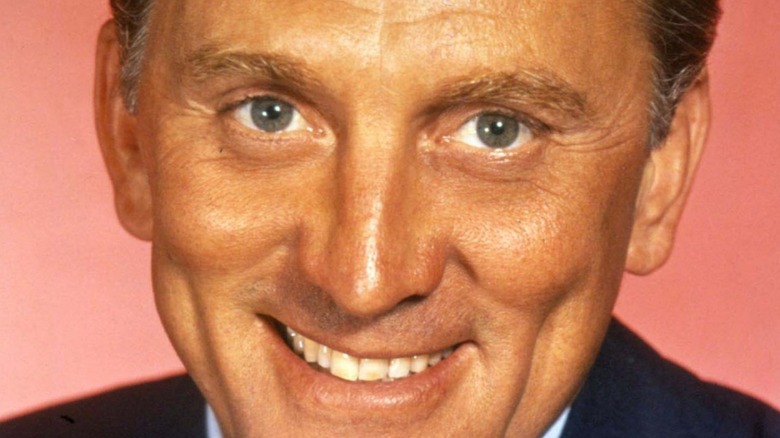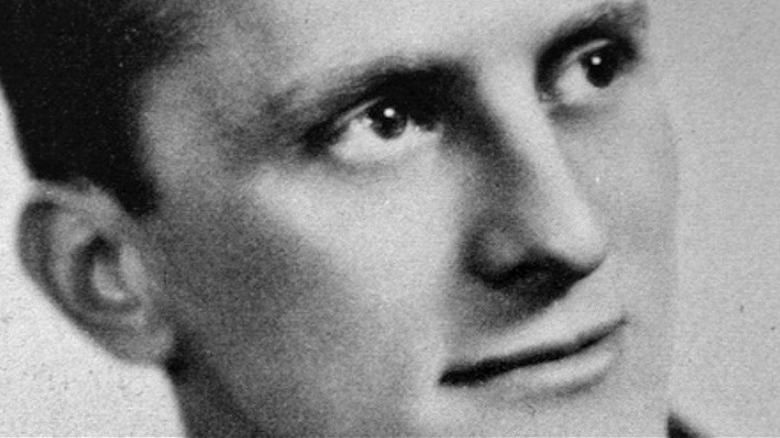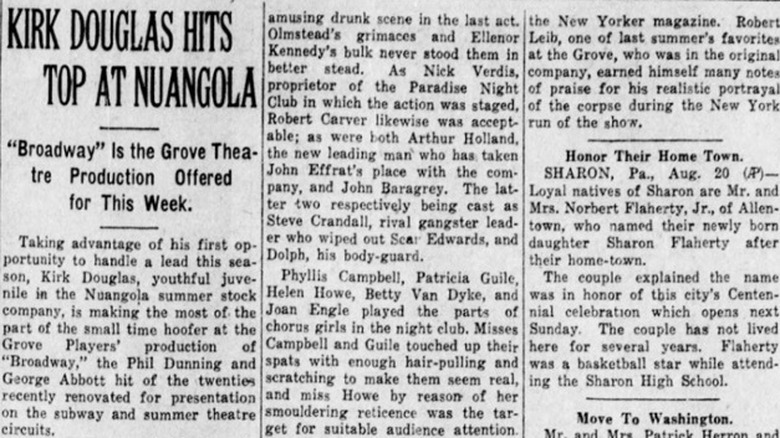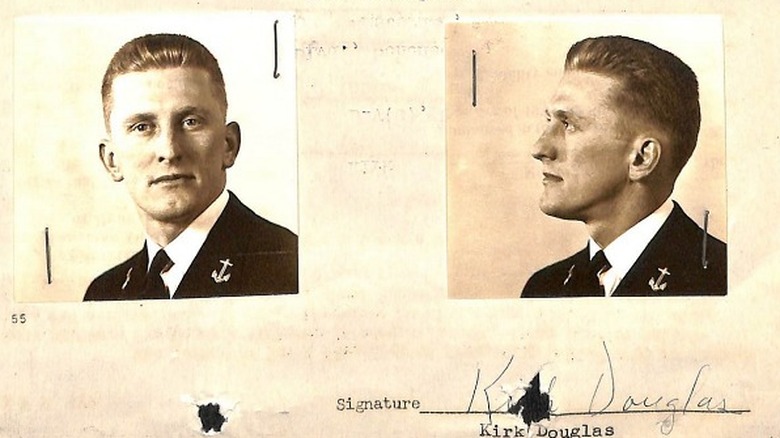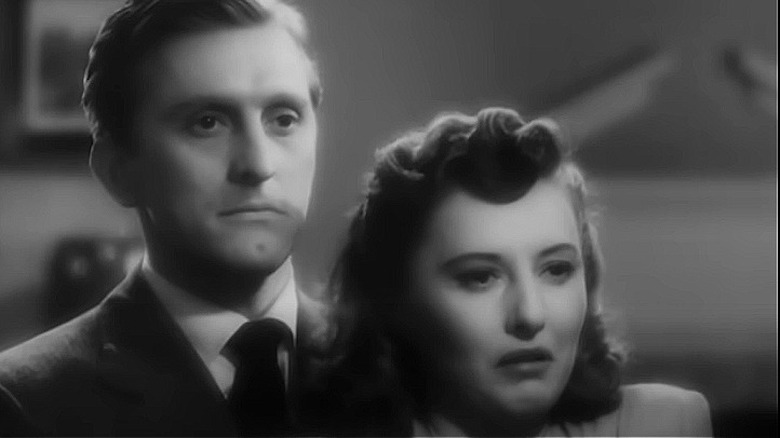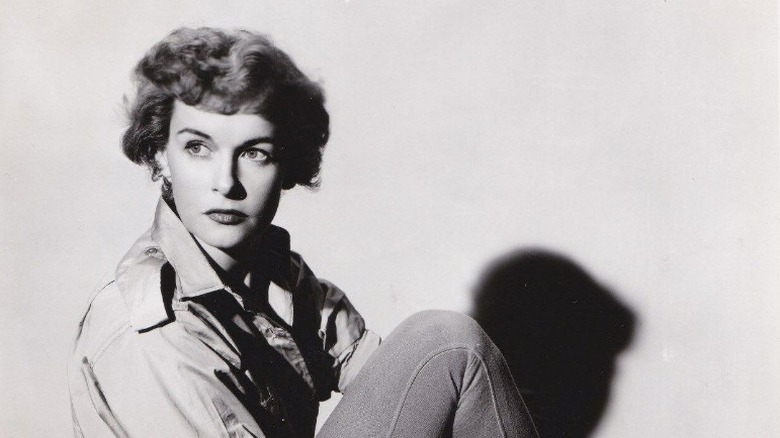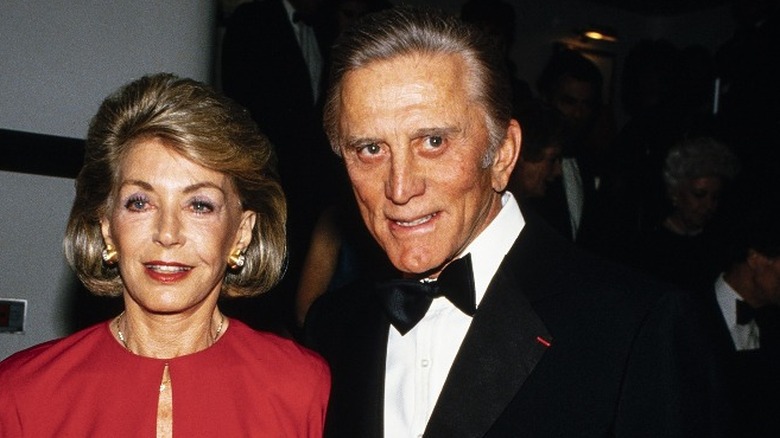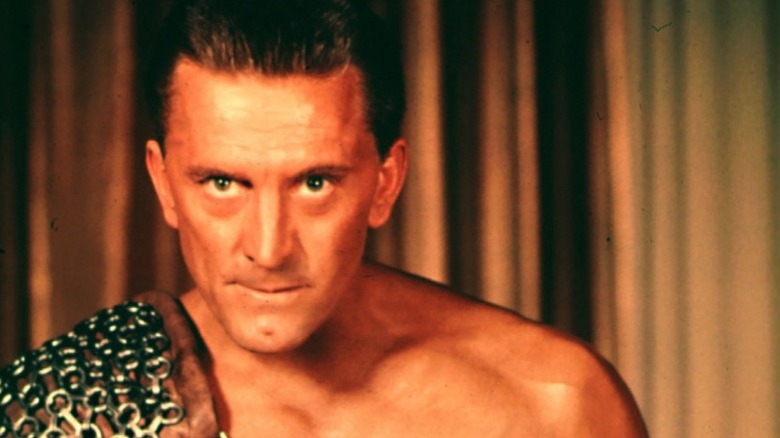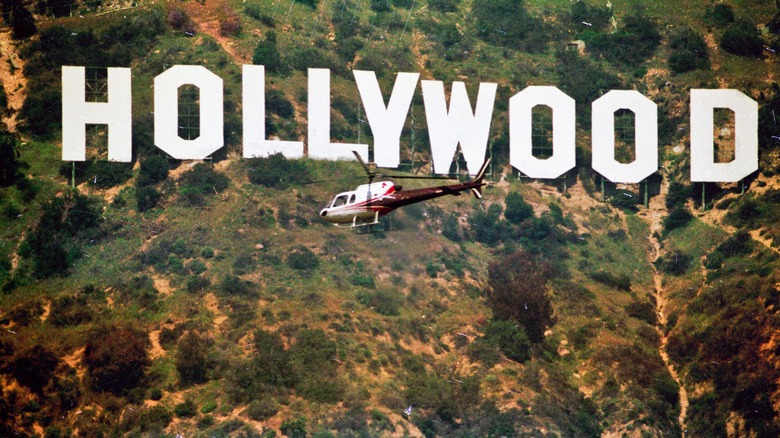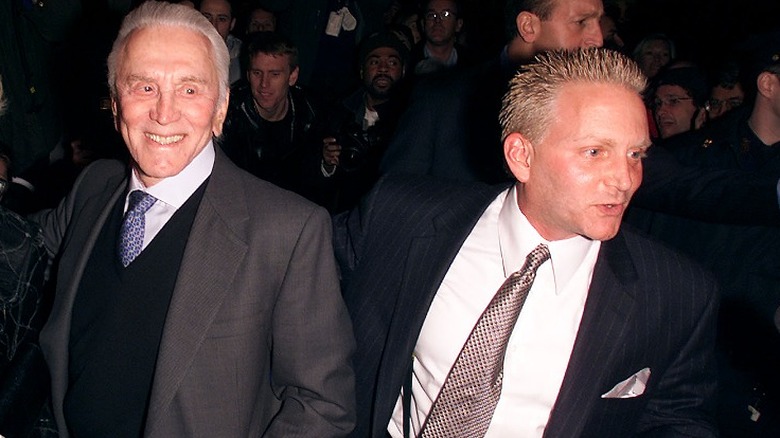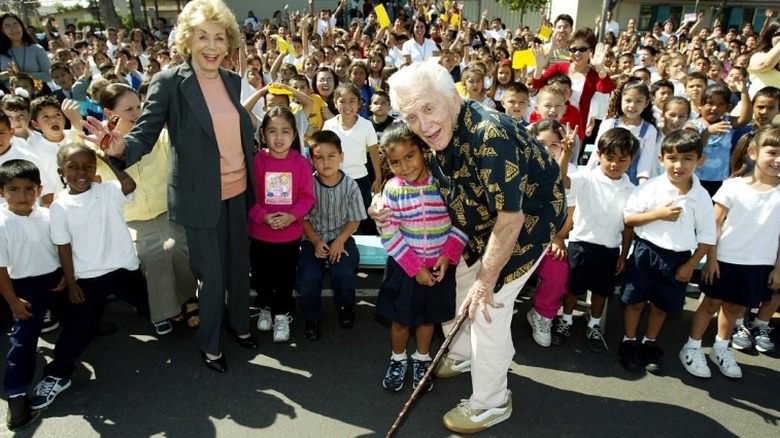Here's The Real-Life Story Of Kirk Douglas
He never won an acting Oscar. He was never named "The King of Hollywood." He inspired no biopics. Yet few movie stars have ever experienced the kind of sustained public attention that big screen tough guy Kirk Douglas has. With his go-for-broke acting style and distinctive good looks — strong jaw, dimpled chin, fierce green eyes, and athletic physique — Douglas carved a unique place for himself in Old Hollywood history. As tallied by IMDb, over a 62-year span, Douglas appeared in 74 films and over a dozen TV movies and miniseries. In his last decades, he embraced his Judaism and became a revered humanitarian, as noted by The New York Times, as well as a prolific author. In addition to his 1988 autobiography "The Ragman's Son," Douglas published dozens of books, novels, and essays, writing right up to his death at 103.
Along with his varied successes, however, Douglas faced many challenges, professional and personal. Underpinning his talent, generosity, and empathy was a toughness born of hardship, prejudice, and tragedy. According to the Los Angeles Times, Douglas described himself as a "son of a b***h" whose scarring, Dickensian childhood filled him with a lifelong churning rage. Along with ambition and righteousness, his inner fury sometimes fueled destructiveness. Kirk Douglas' journey as the world's most famous cinematic and social gladiator was, in short, a long and contradictory tale.
Kirk Douglas graduated from the school of hard knocks
As noted by The New York Times, Kirk Douglas was born Issur Danielovitch in 1916 in Amsterdam, New York, the only son of impoverished Jewish Russian immigrants. Because of their religion, his father, Herschel Danielovitch, was prohibited from working in the local mills and became a lowly ragman, or junk dealer, instead. In an interview (via the actor's official website), Douglas described his family of nine as the poorest family "on a street of poor families." He slept on a "shabby living-room sofa" in an unheated clapboard house. When he was hungry, he would sometimes steal food from neighbors or produce stands. As noted in Forward, every day, Douglas was attacked by a street gang who hurled pebbles and antisemitic slurs at him.
According to the Los Angeles Times, Douglas' biggest obstacle, however, was his father. The illiterate, alcoholic Danielovitch loved to brawl with strangers but withheld his affection from Douglas, coldly refusing to acknowledge any of his achievements. Because his father was an "indifferent provider," Douglas was compelled to take odd jobs to support his family. During his youth, Douglas reportedly held 40 different menial jobs while also attending school. In high school, he excelled in drama and wrestling, and after graduating, he hitchhiked to St. Lawrence University and convinced a dean to grant him admission and a loan. With his eyes on the prize, Douglas turned the loan into a scholarship and his amateur wrestling into a paying circus gig.
From the hard way, he found the Great White Way
Kirk Douglas' drive and determination lost no steam in college. According to Theater Mania, after wrestling for the circus, Douglas spent his college summers acting at small theaters in the Adirondacks and Pennsylvania. During the school year, he supplemented his scholarship working as an usher, bellhop, and waiter, according to Britannica. As reported by The New York Times, in his junior year, despite being excluded from fraternities for being Jewish, he was elected student body president, becoming the first person of his religion to achieve that distinction.
In 1939, during his final summer of college, the budding actor decided to change his name to Kirk Douglas, a moniker he described in an interview (via the actor's official website) as "masculine and strong." After a killer audition, the newly graduated Douglas earned a scholarship to the prestigious American Academy of Dramatic Arts in Manhattan. There he met two students who would later play important roles in his life, the teenaged Lauren Bacall and Diana Dill.
Douglas continued to do summer stock, earning good local reviews, and shortly after graduating from acting school in 1941, he scored his first Broadway role in the musical "Spring Again." Although his part as the singing Western Union messenger was small, the show's director cast him in another part in a 1942 revival of Anton Chekhov's "The Three Sisters." After years of battling poverty and antisemitism, Douglas' theater career seemed poised to take flight. Then world events suddenly intervened.
Kirk Douglas heard the call of duty and signed up
Right after Pearl Harbor and America's entrance into World War II, Kirk Douglas, as he told Playbill in 1960 (via the Navy Times), felt "a wave of patriotism and a wave of Jewishness" and, putting aside his acting ambitions, tried to enlist as an Army pilot. His dream of dropping bombs on Hitler was thwarted when he failed the dexterity test, but he later enlisted in the Navy and took a midshipman course at Notre Dame. He reported for duty in December 1942 during the run of "The Three Sisters," according to records at the National Archives.
As detailed in Vantage Point, Douglas trained as a communications officer in anti-submarine warfare and was sent to the Pacific. Assigned to a submarine chaser, he served as both a gunnery and communication officer. In February 1943, the ship realized a Japanese submarine was nearby and prepared to fire on it. But a near-disaster almost killed Douglas. One of his crew members accidently launched a live depth charge, which exploded as soon as it hit the water. The ensuing blast launched the boat into the air and Douglas was slammed violently against the ship. Douglas was hospitalized with abdominal injuries, and after being diagnosed with amoebic dysentery as well, he was discharged from the Navy as a junior grade lieutenant.
His military service cut dramatically short, Douglas returned to Manhattan and the theater world.
Hollywood beckoned, with help from Lauren Bacall
Kirk Douglas' return to Broadway in 1943, as noted by Theater Mania, was hardly triumphant. After being cast in a musical, he suffered a psychosomatic illness that crippled his singing voice and forced him to be replaced in the role. Former school chum Lauren Bacall, now a rising screen star, stepped in and urged Hollywood producer Hal Wallis to watch his performance in another show. Impressed, Wallis ended up casting Douglas in his next movie, "The Strange Loves of Martha Ivers," opposite Barbara Stanwyck. Douglas made his screen debut in 1946 and never looked back.
According to TMC, after his successful debut, Douglas' screen career exploded with roles in the film noir classic "Out of the Past" (1947) and "I Walk Alone" (1948), the first of seven films he made with good friend Burt Lancaster. His first Oscar nomination came in 1949 with his performance as a cocky boxer in "Champion." He lost, but his reputation as a leading tough guy was cemented and many prestigious films followed. He received two more Oscar nominations for "The Bad and the Beautiful" (1952) and "Lust for Life" (1956), in which he portrayed the tormented Vincent van Gogh.
In 1955, he formed his own production company, Bryna Productions, named in honor of his mother. Along with Burt Lancaster's company, Bryna became one of Hollywood's first and most successful actor-based production companies.
It was love at first (or second) sight
When Kirk Douglas first met her at the acting academy, Diana Dill, the daughter of a proper British Jamaican lawyer, was only 16, according to the Los Angeles Times. After graduating, while Douglas was pursuing his theater career, Dill went to Hollywood and worked as a fashion model and a contract player for Warner Brothers. As recounted in The Seattle Times, while Douglas was in the Navy, he saw a photo of Dill on the cover of Life magazine and bragged to his shipmates that he would someday marry her. Less than a year later, he made good on his pledge.
In her autobiography, as reported by the New York Daily News, Dill confessed that just before the marriage, she had an affair with notorious womanizer Errol Flynn, who also helped her procure an illegal abortion. Compared to the sexual habits of her soon-to-be husband, however, these transgressions proved minor. Douglas cheated repeatedly on Dill during their marriage, and Dill cited his ongoing adultery as one of the factors that led to their divorce in 1951.
The couple had two sons, Michael, who followed in his father's movie star steps, and Joel, who went into film producing. Douglas and Dill remained friends, and in 2003, they appeared together as husband and wife in the film "It Runs in the Family," which also starred Michael as their son.
Kirk Douglas had a lust for love and marriage
According to Hollywood Reporter, in 1953, while filming "Act of Love" in Paris, Douglas met film publicist Anne Buydens (born Hannelore Marx in Germany). At the time, he was secretly engaged to Italian actress Pier Angeli, and Buydens had a wartime husband. Smitten, Douglas offered Buydens a job as his assistant, but sure he was interested only in a fling, she declined. When the pair encountered each other again on another production, she relented, becoming both his publicist and lover.
In "Kirk and Anne: Love Letters, Laughter, and a Lifetime in Hollywood" (via Country Living), Douglas described Buydens as a "sophisticated woman, unlike my virginal Pier Angeli, who took her mother on all our dates." Douglas eventually broke off his engagement, but Buydens threatened to leave him after a big fight. Unable to imagine life without her, Douglas proposed, and in May 1954, they went to Las Vegas for a quickie wedding.
For the next 66 years, the couple remained married, a feat that both attributed to Buydens' European attitudes about infidelity. As noted in Town and Country, Buydens accepted Douglas' adultery, which included dalliances with Rita Hayworth and Patricia Neal. (According to the Los Angeles Times, in her 2021 book, Lana Wood accused Douglas of sexually assaulting her sister Natalie Wood when she was a teenager.) In 2004, the couple celebrated their 50th anniversary, recommitting to each other in a big wedding. They had two children together, Peter and Eric.
He was Trumbo
In his 2012 book "I Am Spartacus!: Making a Film, Breaking a Blacklist," Kirk Douglas states that when he arrived in Hollywood in 1945, he had little awareness about politics or the goings-on of the House Un-American Activities Committee (HUAC). As noted by History, HUAC was a subpoena-wielding committee of the U.S. House of Representatives charged with investigating communist activities during the Cold War. Hollywood was the committee's most visible target, and in October 1947, when 10 filmmakers, including screenwriter Dalton Trumbo, refused to cooperate by "naming names," all were jailed for contempt of Congress and were blacklisted by the film industry.
Another writer who fell victim to HUAC, as noted in "I Am Spartacus!," was popular author Howard Fast. During his incarceration for contempt, Fast began work on a novel about Roman slave Spartacus and the rebellion he inspired. Later, a now-enlightened Douglas decided to turn Fast's book into a film, and according to The New York Times, hired Trumbo to write the screenplay. Out of necessity, Trumbo had been writing for years for little money using pseudonyms, but Douglas felt it was past time to reject this hypocritical, exploitative practice. Using his star power as leverage, he insisted Trumbo be credited under his real name.
The allegorical "Spartacus," whose signature line "I am Spartacus" has become synonymous with noble protest, opened in 1960 to rave reviews. Its success helped end the blacklist and cemented Douglas' reputation as a righteous creative force.
Kirk Douglas had brushes with death
Although Kirk Douglas enjoyed excellent health for most of his life, his mortality was tested on more than one occasion. According to Town and Country, in 1958, Douglas was set to fly on a private plane with director Mike Todd from Palm Springs to New York. Shortly before the flight, Anne Buydens told Douglas she had a "strange feeling" about it and insisted he not get on the plane. The couple fought, but in the end, Douglas agreed not to go. As noted by Hollywood Reporter, the next day, driving back to Los Angeles, they heard on the car radio that Todd's plane had crashed, killing all aboard. "She saved my life," Douglas declared.
In 1991, Douglas had a real life-altering brush with death. As recounted in USA Today, the actor was a passenger on a Los Angeles-bound helicopter when the pilot collided with a small stunt plane near the runway. The plane exploded in a fireball, killing both passengers, and the helicopter tumbled to the tarmac. Unconscious, his spine damaged, Douglas was saved from the burning wreckage. He soon was back on his feet, but the accident left him with long-lasting physical and psychological pain.
According to The New York Times, Douglas' biggest health challenge occurred in 1996 when he suffered a stroke that seriously impaired his speech and led to depression and thoughts of suicide. Ever the fighter, though, Douglas worked hard on his rehabilitation and returned to the limelight a few months later.
He suffered a parent's worst fate
Much has been written about Kirk Douglas and his close relationship with his highly successful son Michael. Beyond the tabloids, less is known about his youngest son, Eric, who died of a drug overdose in 2004 at 46. As detailed in The Guardian, Eric pursued acting as a young man, attending drama school in London. He was talented, according to one acting coach, but his career never took off. According to Entertainment Weekly, most of his film appearances were walk-ons, and by 1991, he had stopped acting in movies altogether. A stint as a standup comedian also ended in failure, and the only publicity he received were news reports about his drug and alcohol abuse and his sometimes-criminal misadventures. In 1999, he fell into a pill-induced 8-day coma, which caused permanent damage to his speech and gait.
Instead of opening doors, being "the youngest son of a famous family" had proved an emotional burden for Eric. Kirk Douglas reportedly described Eric as having inherited all of his worst tendencies and commented that loving and hating Eric was like loving and hating himself. Like Kirk had with his father, Eric needed Kirk's approval, and while Kirk was a more supportive father than his own, Eric apparently struggled to feel loved and accepted. As reported in the New York Daily News, Kirk, then 86, took Eric's death very hard, especially as it happened shortly after he and Anne Buydens had given him a tough-love ultimatum to get clean.
If you or anyone you know is struggling with addiction issues, help is available. Visit the Substance Abuse and Mental Health Services Administration website or contact SAMHSA's National Helpline at 1-800-662-HELP (4357).
He became a champion of many
As Kirk Douglas' acting career began to wind down, his philanthropic work took center stage. He and Anne Buydens formed the Douglas Foundation in 1964, and according to the actor's official website, it stands out as one of the oldest private charitable organizations in the entertainment industry. As noted by The New York Times, among his many ongoing charitable works are the building of 400 school playgrounds, the Kirk Douglas High School, which helps troubled students stay in school, and the Anne Douglas Center for Homeless Women, which provides treatment for drug and alcohol addiction.
According to his official website, in addition to his philanthropic endeavors, Douglas was a longtime Goodwill Ambassador for the U.S. State Department and U.S. Information Agency. He made his first goodwill visit in 1963 to Colombia, at the behest of Bobby Kennedy, and friend President John F. Kennedy also enlisted his help. Over the next 25 years, Douglas traveled around the world, promoting American ideals. In 1981, in recognition of his service, Douglas received the Presidential Medal of Freedom from Jimmy Carter, the highest civilian honor awarded.
Kirk Douglas earned many more accolades, including a Kennedy Center Honors award in 1994, and a 1996 honorary Academy Award for "50 years as a creative and moral force in the motion picture community" (via IMDb). On February 5, 2020, he died at age 103. His long and paradoxical life journey was over, and fittingly, according to NME, he left most of his $61 million fortune to charity.
